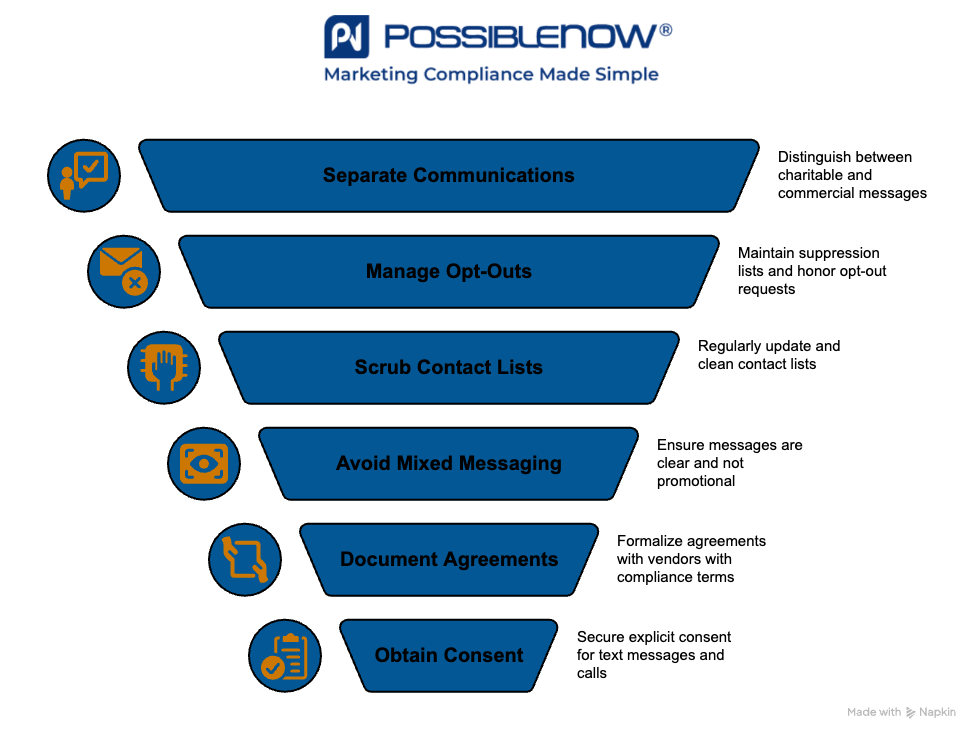Resource Center
How Do Not Contact Rules Apply to Nonprofit Organizations
Type: Blog
Topic: Do Not Call Solution

Nonprofit organizations are subject to Do Not Contact rules, but with some key differences from for-profit businesses. While tax-exempt charitable organizations may qualify for certain exemptions under the FTC’s Telemarketing Sales Rule (TSR) and the Telephone Consumer Protection Act (TCPA), they are not broadly immune from compliance responsibilities. Violating these rules—intentionally or not—can expose nonprofits to legal penalties and public trust issues.
To stay compliant, nonprofits must:
- Confirm whether an activity qualifies as exempt under TSR or TCPA
- Maintain and honor an internal Do Not Contact list
- Scrub call lists against the National Do Not Call Registry unless fully exempt
- Avoid partnerships or campaigns that mix charitable asks with commercial content
- Obtain prior express consent for robocalls, texts, or autodialed communications
- Document all third-party vendor outreach and compliance roles
In the following sections, you’ll find information on:
Speak With an Expert Today
When Nonprofits Are Exempt from DNC Restrictions
Under the TSR, tax-exempt nonprofit organizations making calls solely for charitable purposes are generally exempt from the National Do Not Call Registry requirements. This exemption allows nonprofits to call individuals on the registry without penalty, as long as the communication is purely fundraising-related and conducted by the nonprofit itself.
However, several critical limitations apply:
- The exemption does not cover messages sent via autodialers or robocalls to mobile phones, which are regulated under the TCPA
- Using a for-profit telemarketer does not by itself remove the charitable exemption from the National DNC Registry; but the campaign must be exclusively charitable and comply with charitable-call rules. Any commercial element ends the exemption.
- Any commercial promotion—even tied to a charitable campaign—can disqualify the exemption
Penalties for Non-Compliance and Enforcement
Nonprofits that violate the TCPA or TSR can face significant consequences. Under the TCPA, organizations may be liable for:
- $500 to $1,500 per unsolicited call or text, depending on whether the violation is deemed willful
- Class action lawsuits, which can multiply damages across thousands of contacts
- Enforcement actions from the FTC if calls violate TSR standards, particularly when a nonprofit fails to honor internal opt-out requests
Even if a nonprofit believes it is exempt, liability can arise if it works with vendors or affiliates that fail to follow the law. Courts have held organizations accountable for the actions of their partners when they act under the nonprofit’s direction or on its behalf.
Best Practices for Nonprofit Outreach

To reduce legal exposure and help reinforce donor trust and operational credibility, nonprofits should adopt disciplined outreach practices such as:
- Keeping a clear separation between charitable and commercial communications
- Maintaining an internal suppression list and honoring all opt-out requests promptly
- Scrubbing contact lists regularly, even when exemptions may apply
- Avoiding vague or mixed messaging that could reclassify outreach as promotional
- Documenting agreements with any third-party vendors and including explicit compliance terms
- Gaining clear consent before sending text messages or autodialed calls
How PossibleNOW Can Help
Nonprofits navigating the complex landscape of contact regulations need tools that adapt to their communications strategy without compromising compliance. With PossibleNOW’s Do Not Call solution, organizations can scrub call lists against all applicable registries and maintain a defensible position for exempt and non-exempt campaigns alike.
For nonprofit teams using multiple outreach methods, MyPreferences offers a centralized way to manage consent across email, phone, text, and mail. It integrates with third-party systems and records opt-outs in real time, which is critical for compliance with the TCPA’s mobile contact rules.
PossibleNOW also supports nonprofits through robust TCPA compliance services that help clarify gray areas around vendor liability, mixed-purpose campaigns, and regulatory updates.
To protect your outreach programs and maintain donor trust, talk to us about building a more accountable, unified contact strategy.
Request a Demo Today
About PossibleNOW
PossibleNOW is the pioneer and leader in customer consent, preference, and regulatory compliance solutions. We leverage our MyPreferences technology, processes, and services to enable relevant, trusted, and compliant customer interactions. Our platform empowers the collection, centralization, and distribution of customer communication consent and preferences across the
enterprise. DNCSolution addresses Do Not Contact regulations such as TCPA, CAN-SPAM and CASL, allowing companies to adhere to DNC requirements, backed by our 100% compliance guarantee.
PossibleNOW’s strategic consultants take a holistic approach, leveraging years of experience when creating strategic roadmaps, planning technology deployments, and designing customer interfaces. PossibleNOW is purpose-built to help large, complex organizations improve customer experiences and loyalty while mitigating compliance risk.
-
TCPA Regulations and Compliance: Complete Guide
Type: Blog
Topic: Do Not Call Solution
-
Defining Meaningful Metrics: 6 Soft KPIs to Measure Customer Preference Collection
Type: Blog
Topic: Preference Mgmt
-
Email Preference Center Best Practices
Type: Blog
Topic: Preference Mgmt
-
The Basics of DNC Scrubbing: What Is a Do Not Call (DNC) Scrubber and Why Do You Need It?
Type: Blog
Topic: Do Not Call Solution
-
What is Consent Management, How it Works, & Why it’s Important for Data Compliance
Type: Blog
Topic: Consent Mgmt
-
Do Insurance Companies Cover TCPA Damages?
Type: Blog
Topic: Do Not Call Solution
-
8 Best Practices for Capturing GDPR Consent
Type: Webinars
-
Data Silos Cause Communication Gaps
Type: Videos
Topic: Preference Mgmt
-
Difference Between Preferences & Consent
Type: Videos
Topic: Preference Mgmt
-
Integrate Do Not Call Compliance with Preferences
Type: Videos
Topic: Preference Mgmt
-
Customer Preferences Require More Than One Flavor
Type: Videos
Topic: Preference Mgmt
-
Give Customers Opt-Down Options
Type: Videos
Topic: Preference Mgmt
-
Preference Center Organization
Type: Videos
Topic: Preference Mgmt
-
Strategic Consultants Benefited Scotiabank
Type: Videos
Topic: Industry Testimonials
-
Best Practices for Managing Do Not Email Lists
Type: Blog
Topic: Do Not Call Solution
-
How Do Not Call Rules Apply to Nonprofit Organizations
Type: Blog
Topic: Do Not Call Solution
-
How to Train Your Call Center on DNC Rules
Type: Blog
Topic: Do Not Call Solution
